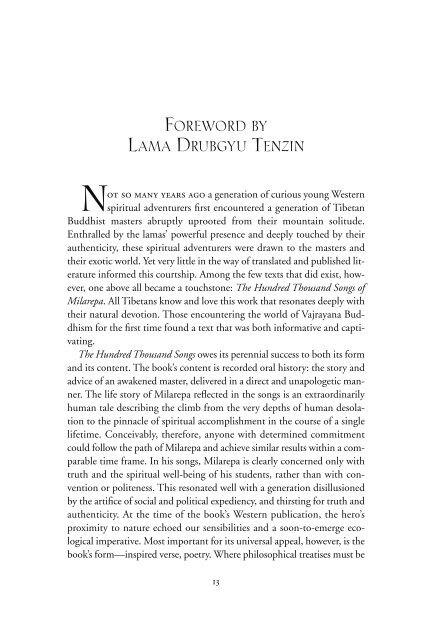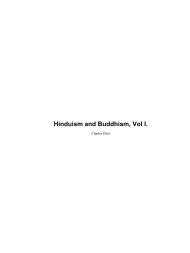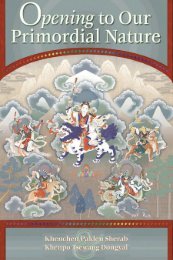- Page 1 and 2: TSADRA Timeless Rapture Inspired Ve
- Page 3 and 4: The Tsadra Foundation Series publis
- Page 5 and 6: Snow Lion Publications P.O. Box 648
- Page 8 and 9: CONTENTS List of Illustrations 10 F
- Page 10 and 11: Jamgon Kongtrul 355 Kalu Rinpoché
- Page 12: FOREWORD BY BOKAR RINPOCHÉ Two wis
- Page 17 and 18: 16 Timeless Rapture significant te
- Page 19 and 20: 18 Timeless Rapture focus and reve
- Page 21 and 22: 20 Timeless Rapture activity he wa
- Page 24 and 25: TRANSLATOR’S PREFACE Years ago, I
- Page 26 and 27: Translator’s Preface 25 good it
- Page 28 and 29: Translator’s Preface 27 doesn’
- Page 30 and 31: Tibet’s religious institutions, w
- Page 32 and 33: Translator’s Preface 31 in six-s
- Page 34 and 35: Translator’s Preface 33 How do w
- Page 36: Translator’s Preface 35 the sea
- Page 40 and 41: B Illustrious Buddha Vajra Bearer
- Page 42 and 43: Padma Kamala-ya Tram Offer The Mand
- Page 44 and 45: Noble Mokchok-pa, bodhisattva in yo
- Page 46 and 47: BUDDHA VAJRA BEARER The sixth conqu
- Page 48 and 49: NIGUMA The wisdom dakini known as N
- Page 50 and 51: SUKASIDDHI The wisdom dakini known
- Page 52 and 53: To use the mind to watch the mind b
- Page 54 and 55: Unbiased, it is not stained by anyt
- Page 56 and 57: Settle within the three existences
- Page 58 and 59: RAHULA Rahula was born in southern
- Page 60 and 61: This subtle contemplative practice
- Page 62 and 63: KYUNGPO NALJOR Namo Guru! The renow
- Page 64 and 65:
A Sea of Blessings 63 Among whom f
- Page 66 and 67:
After I had made this request, The
- Page 68 and 69:
The special features of the five gr
- Page 70 and 71:
Denpa at the summit of Mount Malaya
- Page 72 and 73:
A Sea of Blessings 71 These teachi
- Page 74 and 75:
A Sea of Blessings 73 Following th
- Page 76 and 77:
fourteenth stage in Blissful Pure L
- Page 78 and 79:
Objects of attachment and aversion
- Page 80 and 81:
Once, when Kyungpo Naljor taught Th
- Page 82 and 83:
Vajra Dakini protects you from obst
- Page 84 and 85:
My voice is the Conqueror’s speec
- Page 86 and 87:
My body of ripened karma is the Con
- Page 88 and 89:
This great bliss in the conduct of
- Page 90 and 91:
The song of the experience of six a
- Page 92 and 93:
Few in a hundred have them all. Tha
- Page 94 and 95:
Meditate, meditate with the mind on
- Page 96 and 97:
You’ve doused a great pyre of ang
- Page 98 and 99:
Grasping the illusory city of life
- Page 100 and 101:
A Sea of Blessings 99 Settle in th
- Page 102 and 103:
Your anger will unravel in its own
- Page 104 and 105:
Exalted above all, he is attached t
- Page 106 and 107:
You won’t realize the mind’s na
- Page 108 and 109:
The vajra song that introduces the
- Page 110 and 111:
The holy master endowed with the li
- Page 112 and 113:
They originate with the wisdom daki
- Page 114 and 115:
In unborn, luminous space, The self
- Page 116 and 117:
Rejection of existence and acceptan
- Page 118 and 119:
If you don’t use torma and feast
- Page 120 and 121:
Faithful and respectful ordained pe
- Page 122 and 123:
After you finish prayers infused wi
- Page 124 and 125:
Appearance without intrinsic nature
- Page 126 and 127:
And overpowers the eight worldly co
- Page 128 and 129:
If you don’t control your own min
- Page 130 and 131:
Whoever becomes deeply familiar wit
- Page 132 and 133:
Produced incalculable accomplished
- Page 134 and 135:
My mind’s natural movement in spa
- Page 136 and 137:
The mind that considers delicious T
- Page 138 and 139:
The unveiled state’s intrinsic fo
- Page 140 and 141:
A Sea of Blessings 139 In the path
- Page 142 and 143:
Habitual patterns’ powerful suppl
- Page 144 and 145:
A Sea of Blessings 143 Once you ha
- Page 146 and 147:
I see how fleeting things are in th
- Page 148 and 149:
All accomplished masters’ heart-e
- Page 150 and 151:
From the buddhas’ three bodies of
- Page 152 and 153:
It will finish as a heap of bones.
- Page 154 and 155:
How can attachment to news and goss
- Page 156 and 157:
You need decisive certitude [in the
- Page 158 and 159:
The first, outer appearances, a mag
- Page 160 and 161:
Develop devotion [toward your maste
- Page 162 and 163:
Today I the vagrant yogi, Whose lif
- Page 164 and 165:
A Sea of Blessings 163 The vital i
- Page 166 and 167:
Lord, qualified spiritual master, I
- Page 168 and 169:
This steady experience of bliss and
- Page 170 and 171:
Lady who makes spontaneous luminosi
- Page 172 and 173:
High and low, near or far, [blend t
- Page 174 and 175:
JAMYANG KYENTSÉ WANGPO During the
- Page 176 and 177:
Through this smiling play, may I ac
- Page 178 and 179:
A Sea of Blessings 177 Illusory Bo
- Page 180 and 181:
A Cloud of Magical Offerings, a spo
- Page 182 and 183:
JAMGON KONGTRUL The following song,
- Page 184 and 185:
A Sea of Blessings 183 And, due to
- Page 186 and 187:
A Sea of Blessings 185 This repres
- Page 188 and 189:
A Sea of Blessings 187 Your mind n
- Page 190 and 191:
CONCLUSION At the completion of the
- Page 192 and 193:
Further, recite The Sealed Prayer o
- Page 194 and 195:
COLOPHON The precious Oral Instruct
- Page 196 and 197:
By this virtue, may I and others, a
- Page 198 and 199:
A Sea of Blessings 197 Thus the wh
- Page 200 and 201:
The view and the viewer will separa
- Page 202 and 203:
Wherever you live is a pure land, A
- Page 204 and 205:
Toward your kind parents, the six k
- Page 206 and 207:
Debate’s auspicious fortune is vi
- Page 208 and 209:
Ignorant of the consequences of the
- Page 210 and 211:
Yet it is not nonexistent: anything
- Page 212 and 213:
Purbu Tashi, and Lama Pasang Dorjé
- Page 214 and 215:
Apparent existence in infinite puri
- Page 216 and 217:
Namo Guru! When singing supplicatio
- Page 218:
A Sea of Blessings 217 In 1995, in
- Page 222 and 223:
BUDDHA VAJRA BEARER Persons unfamil
- Page 224 and 225:
The Shangpa Masters and Their Linea
- Page 226 and 227:
The Shangpa Masters and Their Linea
- Page 228 and 229:
NIGUMA The Shangpa Instruction Line
- Page 230 and 231:
The Shangpa Masters and Their Linea
- Page 232 and 233:
The Shangpa Masters and Their Linea
- Page 234 and 235:
The Shangpa Masters and Their Linea
- Page 236 and 237:
SUKASIDDHI Sukasiddhi’s accomplis
- Page 238 and 239:
The Shangpa Masters and Their Linea
- Page 240 and 241:
The Shangpa Masters and Their Linea
- Page 242 and 243:
MÉTRIPA Most Western Buddhists fir
- Page 244 and 245:
The Shangpa Masters and Their Linea
- Page 246 and 247:
RAHULA Rahula was unique among Kyun
- Page 248 and 249:
The Shangpa Masters and Their Linea
- Page 250 and 251:
DORJÉ DENPA Although Jamgon Kongtr
- Page 252 and 253:
The Shangpa Masters and Their Linea
- Page 254 and 255:
The Shangpa Masters and Their Linea
- Page 256 and 257:
The Shangpa Masters and Their Linea
- Page 258 and 259:
The Shangpa Masters and Their Linea
- Page 260 and 261:
of the lineage masters are our crit
- Page 262 and 263:
The Shangpa Masters and Their Linea
- Page 264 and 265:
The Shangpa Masters and Their Linea
- Page 266 and 267:
The Shangpa Masters and Their Linea
- Page 268 and 269:
RINCHEN TSÖNDRU The Shangpa lineag
- Page 270 and 271:
The Shangpa Masters and Their Linea
- Page 272 and 273:
The Shangpa Masters and Their Linea
- Page 274 and 275:
The Shangpa Masters and Their Linea
- Page 276 and 277:
CHÖKYI SENGÉ In The Blue Annals,
- Page 278 and 279:
The Shangpa Masters and Their Linea
- Page 280 and 281:
The Shangpa Masters and Their Linea
- Page 282 and 283:
The Shangpa Masters and Their Linea
- Page 284 and 285:
The Shangpa Masters and Their Linea
- Page 286 and 287:
The Shangpa Masters and Their Linea
- Page 288 and 289:
The Shangpa Masters and Their Linea
- Page 290 and 291:
The Shangpa Masters and Their Linea
- Page 292 and 293:
The Shangpa Masters and Their Linea
- Page 294 and 295:
Sole son of the dakini, to you I pr
- Page 296 and 297:
The Shangpa Masters and Their Linea
- Page 298 and 299:
The Shangpa Masters and Their Linea
- Page 300 and 301:
The Shangpa Masters and Their Linea
- Page 302 and 303:
The Shangpa Masters and Their Linea
- Page 304 and 305:
You truly gathered the dakinis; to
- Page 306 and 307:
The Shangpa Masters and Their Linea
- Page 308 and 309:
The Shangpa Masters and Their Linea
- Page 310 and 311:
The Shangpa Masters and Their Linea
- Page 312 and 313:
The Shangpa Masters and Their Linea
- Page 314 and 315:
The Shangpa Masters and Their Linea
- Page 316 and 317:
The Shangpa Masters and Their Linea
- Page 318 and 319:
The Shangpa Masters and Their Linea
- Page 320 and 321:
The Shangpa Masters and Their Linea
- Page 322 and 323:
The Shangpa Masters and Their Linea
- Page 324 and 325:
The Shangpa Masters and Their Linea
- Page 326 and 327:
The Shangpa Masters and Their Linea
- Page 328 and 329:
The Shangpa Masters and Their Linea
- Page 330 and 331:
The Shangpa Masters and Their Linea
- Page 332 and 333:
The Shangpa Masters and Their Linea
- Page 334 and 335:
The Shangpa Masters and Their Linea
- Page 336 and 337:
The Shangpa Masters and Their Linea
- Page 338 and 339:
The Shangpa Masters and Their Linea
- Page 340 and 341:
The Shangpa Masters and Their Linea
- Page 342 and 343:
The Shangpa Masters and Their Linea
- Page 344 and 345:
The Shangpa Masters and Their Linea
- Page 346 and 347:
LOSAL TENKYONG The name Losal Tenky
- Page 348 and 349:
JAMYANG KYENTSÉ WANGPO There is li
- Page 350 and 351:
The Shangpa Masters and Their Linea
- Page 352 and 353:
The Shangpa Masters and Their Linea
- Page 354 and 355:
The Shangpa Masters and Their Linea
- Page 356 and 357:
JAMGON KONGTRUL Jamgon Kongtrul’s
- Page 358 and 359:
The Shangpa Masters and Their Linea
- Page 360 and 361:
The Shangpa Masters and Their Linea
- Page 362 and 363:
The Shangpa Masters and Their Linea
- Page 364 and 365:
The Shangpa Masters and Their Linea
- Page 366 and 367:
The Shangpa Masters and Their Linea
- Page 368 and 369:
The Shangpa Masters and Their Linea
- Page 370 and 371:
The Shangpa Masters and Their Linea
- Page 372 and 373:
The Shangpa Masters and Their Linea
- Page 374 and 375:
The Shangpa Masters and Their Linea
- Page 376 and 377:
BOKAR RINPOCHÉ 64 by Lama Tcheuky
- Page 378 and 379:
The Shangpa Masters and Their Linea
- Page 380 and 381:
The Shangpa Masters and Their Linea
- Page 382 and 383:
The Shangpa Masters and Their Linea
- Page 384 and 385:
The Shangpa Masters and Their Linea
- Page 386 and 387:
GLOSSARY The following lists—of p
- Page 388 and 389:
Guru Chöwang (gu ru chos dbang) Gu
- Page 390 and 391:
Nyentön-pa (gnyan ston pa), also k
- Page 392 and 393:
Names of Buddhas, Deities, Meditati
- Page 394 and 395:
Six Applications Lineage (sbyor ba
- Page 396:
Néling (nas gling) Nésar (gnas gs
- Page 399 and 400:
398 Timeless Rapture dad pa’i me
- Page 401 and 402:
400 Timeless Rapture Kongtrul, Jam
- Page 403 and 404:
402 Timeless Rapture 11 The three
- Page 405 and 406:
404 Timeless Rapture 34 Dungkar Lo
- Page 407 and 408:
406 Timeless Rapture and ten virtu
- Page 409 and 410:
408 Timeless Rapture Gampopa, 14,
- Page 411 and 412:
410 Timeless Rapture Padampa Sangy






